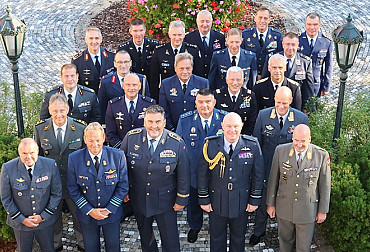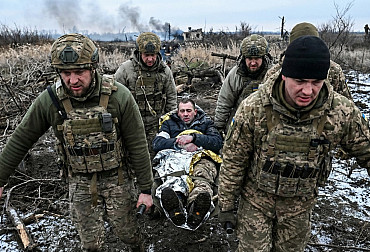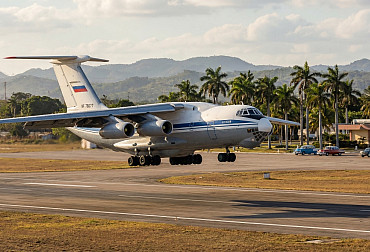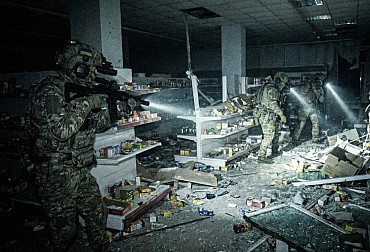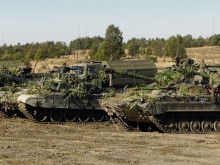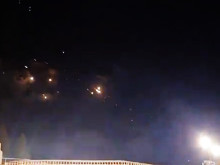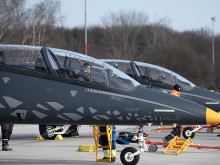The Defence Committee discussed the Public Procurement Act, the acquisition of tracked IFVs and the modernisation of Pandurs
During the 16th session, the Parliamentary Committee on Defence dealt with the amendment to the Public Procurement Act, information on the negotiations on the acquisition of IFVs, information on the activities of the NATO Multinational Battlegroup in Slovakia and, in a closed session, again discussed developments in Ukraine. The committee members also managed to discuss information from the Ministry of Defence and the Czech Army on the modernisation, servicing and replenishment of Pandur armoured vehicles and the situation around the Líně airport in Plzeň. This time the meeting of the Defence Committee took place in the presence of the Minister of Defence Jana Černochová, Chief of the General Staff of the Czech Armed Forces Maj. Gen. Karel Řehka and other guests.
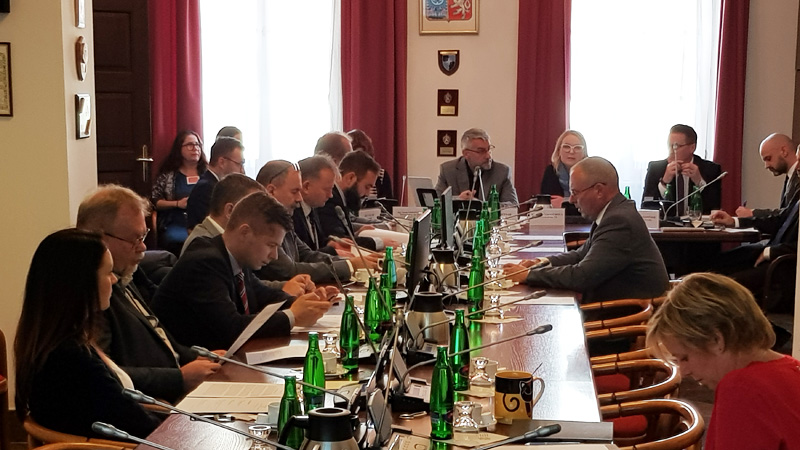 Picture: The Defence Committee, during its 16th meeting, discussed, among other things, the Public Procurement Act, the acquisition of tracked IFVs and the modernisation of Pandurs. | Jan Zilvar / CZ DEFENCE
Picture: The Defence Committee, during its 16th meeting, discussed, among other things, the Public Procurement Act, the acquisition of tracked IFVs and the modernisation of Pandurs. | Jan Zilvar / CZ DEFENCE
At the beginning of the meeting, the deputies dealt with the amendment to the Public Procurement Act prepared by the Ministry of Regional Development. At the beginning of the year, Minister of Defence Jana Černochová declared the amendment of this law as one of the priorities of the "Ten for Defence". "The law allows in some cases to make changes to a contract commitment without having to announce a new tender procedure. However, the implementation of such changes to commitments is not allowed under the provisions of Article 209 for public contracts in the field of defence or security. There are no objective reasons for setting different rules for defence and security contracts than for other public contracts," said Josef Flek, the Committee's vice-chairman, in his introduction. Minister Černochová added that the European Commission had issued an opinion addressing this discrepancy in the law, and therefore there was no reason to continue to differentiate between defence and security tenders and other ministries. "The current regulation now, in a complex security situation and also a significantly worsening economic situation, significantly complicates or directly prevents us from achieving the aforementioned change in the contract commitment," the minister said. The abolition of the aforementioned paragraph was subsequently supported by representatives of the Ministry of the Interior and the Office for the Protection of Competition at the meeting. The opinion of the NSA representative was neutral. In a subsequent vote, the committee unanimously approved the deletion of the problematic restrictions in the law and will submit the amendments to the plenary of the Chamber of Deputies for discussion.
Jana Černochová then gave an update on the procurement of Swedish CV90 MkIV tracked IFV. She recalled that Sweden had held elections, which meant a change in her ministerial counterpart. However, discussions at expert team level continue without interruption. The Army requires vehicles in seven modifications. Most will serve as infantry fighting vehicles, which are designed to carry 11 soldiers and will have a manned turret and a 30-millimetre cannon. Other vehicles will be in command, reconnaissance, engineer, recovery, medical and as an artillery observation vehicle. The Minister further stated that on 1 and 2 September an initiation meeting between the Czech and Swedish sides took place, where the required basic set-up of a possible future contractual relationship was discussed. These meetings were attended by representatives of the Ministry of Defence of the Czech Republic and the Army of the Czech Republic, representatives of the Swedish government agency FMV (which purchases weapons and other equipment for the army) and BAE Systems. At the beginning of these meetings, a high-level meeting was held, which was chaired by First Deputy Minister František Šulc on behalf of the Czech side. The Swedish side was represented by the State Secretary of the Ministry of Defence, the President of BAE Systems and senior representatives of the FMV. Among other things, the basic parameters of industrial cooperation, legal aspects, timing of vehicle deliveries and possible harmonisation with the Slovak order were discussed. After the initiation meeting, intensive mutual communication was initiated, including further meetings between the Ministry of Defence of the Czech Republic as the contracting authority, FMV and BAE Systems to resolve certain problems and uncertainties, including the structure of future contractual relations in order to meet the requirements of the Czech Public Procurement Act. According to the Minister, the coordination of the process of procurement of infantry fighting vehicles with the Slovak side is also continuing. Deputy Minister Koudelka added that, based on the army's request, a 30 mm calibre cannon is also envisaged. The cannon of the same calibre should also be deployed as part of the refurbishment of the Pandur II 8x8 wheeled IFVs, which is already in service with the Czech Armed Forces. According to Koudelka, the share of Czech arms companies is still planned at 40% of the total tender volume. As far as the follow-up service is concerned, even higher involvement of companies is reportedly envisaged, even up to 100%. The brief discussion emphasised in particular the army's ability to train and have available sufficient maintenance experts.
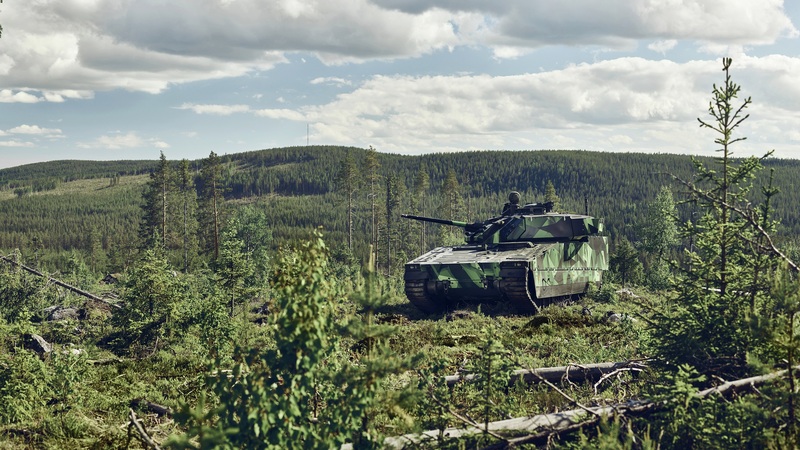 Picture: CV90 IFV | BAE Systems
Picture: CV90 IFV | BAE Systems
Minister Černochová together with the Chief of General Staff, Maj. Gen. Řehka and the Deputy for the Management of the Defence Policy and Strategy Section of the Ministry of Defence Jan Jireš further presented the activities of the NATO Multinational Battlegroup in Slovakia. The Minister recalled that the unit started to operate as a battlegroup on 4 April 2022. The Army of the Czech Republic first sent a unit to prepare the conditions for the arrival of the main forces and the Commando Company of the 43rd Airborne Regiment Chrudim with a total of 230 personnel. The Chrudim paratroopers joined the joint training with the Slovak troops almost immediately. From mid to late July, the main combat units of this international battle group occupied the airfield area, first with a unit from Slovenia, followed by Czech units and then units from Germany and the USA. The battle group underwent a bonding exercise and a certification exercise. In total, 1 050 coalition troops are deployed within the Battle Group, 432 of whom are Czech. The Czech contingent also includes 13 Active Reserve soldiers. Genmjr. Řehka further added that the core part of the unit today consists of members of the 41st Mechanised Battalion from Žatec. The battalion's main combat equipment deployed there is a Pandur II 8x8 wheeled IFVs and a 122mm PRAM-L mortars on Tatra vehicles. The battalion is supplemented by security units focused on communications, personnel transport, logistics and other activities. Coalition partners - Slovaks, Germans, Slovenes, Americans - have a number of units in the battalion, according to Gen. Řehka. Slovenia, for example, has the Valuk light armoured vehicle, which is essentially a modernised Pandur, manufactured with a 12.7mm machine gun. Germany has a Boxer armoured personnel carrier, the Americans have an airborne company and the Slovaks provide a mortar platoon. The unit is Combat ready after certification exercises. General Rehka further said that the creation of such a unit placed new demands not only on the participating states but also on the host Slovakia, but after overcoming initial difficulties, the international battle group is ready to fulfil its mission.
MEPs also discussed the modernisation, servicing and replenishment of Pandur equipment. The Minister began the discussion by recalling the unsatisfactory involvement of the Israeli company Rafael in the repair of the turrets, which the Minister addressed at several levels, including meetings with her Israeli counterpart and the President of Israel. At present, according to Černochová, a framework agreement for full service support of equipment on the Pandur II 8x8 chassis has been concluded with Tatra Defence Vehicle, up to a maximum financial framework of CZK 2.4 billion including VAT, with the contract valid until 25 September 2024.
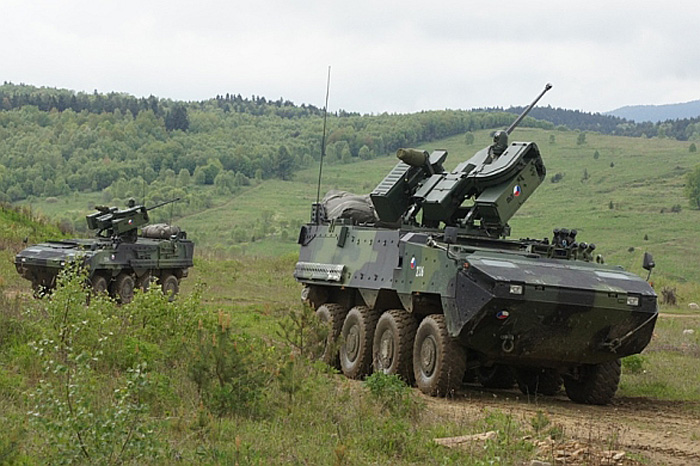
Picture: Pandur II 8x8 Infantry Fighting Vehicles | Ministry of Defence of the Czech Republic
As for the modernisation process itself, according to Deputy Minister Koudelka, it is dependent on the so-called feasibility study, which should be commissioned by the end of this year, with the expectation that it will be completed by June 2023. The terms of reference for this study are still being drafted at the moment. "It should be remembered that this is actually the purchase of 68 new vehicles and the modernisation of 107," Koudelka specified.
The further fate of the airfield in Líně near Plzeň will be discussed by the committee at a future meeting. According to Minister Černochová, it is not up to the Ministry of Defence to decide what the future fate of this facility will be. According to a recently issued press release, this competence lies with the Ministry of Industry and Trade. "The Ministry of Defence has drawn up an opinion on the importance of the Lín airport, the ministry has thus fulfilled the task imposed on it by the government. The document is only a partial basis for the Ministry of Industry and Trade, which will finally submit the material to the government, which will then decide on the project. It is therefore not for the Ministry of Defence to comment on the further procedure and the final proposal," the report states, referring to the non-public expert opinion of the Czech Army. The MPs therefore decided to request the report in a confidential mode and to return to the discussion of this item later. It was also said at the meeting that whatever the future fate of the airport in Lini, the operation of the air ambulance service would be maintained there.
This time our question was: In your opinion, has the amendment to the Public Procurement Act succeeded in introducing the necessary parameters to speed up and streamline the implementation of military tenders? Do you prefer the tendering route or the G-G route, or a combination of both?
Below are the responses received:
Lubomír Metnar (ANO), Chairman of the Committee
In addition to eliminating the shortcomings of the transposition of the European procurement directives, the proposal makes changes that will reduce the administrative burden on both contracting authorities and suppliers, removes the excessive rigidity of some rules and clarifies interpretative ambiguities. However, these are not major conceptual changes to the procurement process.
Today, in the Defence Committee, we supported an amendment that specifically focuses on the possibility of making changes to the contract commitment in certain cases without having to launch a new procurement procedure.
In the area of defence and security procurement, we need to open up a discussion on the creation of a separate law, as Sweden, for example, has. In general, these partial modifications, amendments, do not solve the complex EU legal environment in the field of defence or security procurement. The current security crisis has shown us fully that it is necessary to revise EU legislation and to try to set more effective rules in broad consensus.
Josef Flek (STAN), Vice-Chairman of the Committee
The amendment to the law aims to straighten out the unfair distinction between defence and security contracts. The current state of affairs, also due to a misunderstanding of European directives (the general directive on the award of all public contracts - No 2014/24/EU and the defence directive No 2009/81/EC), has led to the fact that setting the conditions for amending contracts has been much more difficult than for other contracts. Indeed, the General Directive assesses public procurement more precisely than the Defence Directive. At the same time, however, we have chosen a stricter interpretation of the defensive one: if there is no provision on the conditions for modifying commitments, then under the current legal interpretation we cannot modify these commitments. And yet, it is defence and security contracts that require greater flexibility (due to the price of materials, the uniqueness of the product to be delivered, the security situation of the state, etc.). The amendment to our law is therefore an interpretative solution to the conflict that has arisen. I am glad that I was able to play an active role in this change - as the proposer of the amendment. I thank the Ministry of Defence for its cooperation.
When it comes to procurement in these difficult times, it is quite difficult to say whether one approach or the other. I lean towards a combination of both, and we have to take into account the importance of the contract. We cannot leave some strategic and long-term plans of the Army and the MoD at the mercy of tenders, because we may end up in the same way as in the case of IFV - long discussions, reassessments and then delaying or even cancelling the contract anyway. Intergovernmental agreements also strengthen various bilateral and multilateral relations, which I consider extremely important today.
Jan Hofmann (ODS), Vice-Chairman of the Committee
Yes, I believe that there will be an acceleration in the implementation of military tenders.
It is not possible to answer in this way whether one or the other is generally better. It depends on the type of contract, the market situation and other attributes. For large and strategic tenders, G-G is better, but otherwise tenders should be issued.
Stanislav Blaha (ODS), Member of the Committee
The implementation of military tenders is a complex process and I do not know how much effect this amendment will have on it. Moreover, the Public Procurement Act is not very well designed for large strategic contracts. This was particularly evident in the cancelled IFV tender. There are, of course, many smaller projects in the ministry, so it makes sense that the amendment should speed up and make these contracts more transparent. I believe that positive change can happen.
For large contracts, G-G cooperation seems to be more beneficial and faster. However, for ordinary operational contracts and small purchases such as uniforms or ammunition, it would be better to follow the path of the aforementioned law.
Jiří Horák (KDU-ČSL), Member of the Committee
I do not believe that the amendment to the Public Procurement Act will result in a significant acceleration of the implementation of army tenders, and in my opinion this is not the main objective of the amendment. The main purpose of the amendment is to eliminate the shortcomings of the Public Procurement Act criticised by the European Commission. It is true that the adoption of the amendment will, for example, reduce the administrative burden on both contracting authorities and contractors or remove the strictness of certain rules, but these are not fundamental changes that would alter the public procurement process. Otherwise, given the experience to date, I prefer the G-G route.
Karel Krejza (ODS), Member of the Committee
Some of the parameters of the PPA will still need to be modified by an amendment so that the purchase of military equipment can be faster and more flexible and so that contracting authorities and suppliers have fewer obstacles.
Michaela Opltová (STAN), Member of the Committee
Personally, I think that the amendment to the law will greatly help the current situation. Overall, the amendment aims to align Czech and EU public procurement legislation. At the same time, it reduces the administrative burden and clarifies certain rules, which in my opinion will in itself contribute to better implementation of contracts. In the defence sector, the amendment should lead to greater efficiency in the procurement of contracts, particularly in the category falling under the sub-limit exemption.
I prefer a combination of both. It is certainly necessary to take into account the different types of tenders, the advantages of the market and cooperation with our partners within NATO and the EU.











